An Analysis of the Hospitality Industry
VerifiedAdded on 2020/10/05
|12
|3448
|102
AI Summary
The assignment requires students to analyze the hospitality industry, focusing on its current trends, challenges, and opportunities. It involves researching different roles within the industry, their skills, and how they contribute to local economies. The study also includes a review of relevant literature, including books and journals, as well as online resources. The assignment aims to provide students with a comprehensive understanding of the hospitality industry and its significance in the economy.
Contribute Materials
Your contribution can guide someone’s learning journey. Share your
documents today.
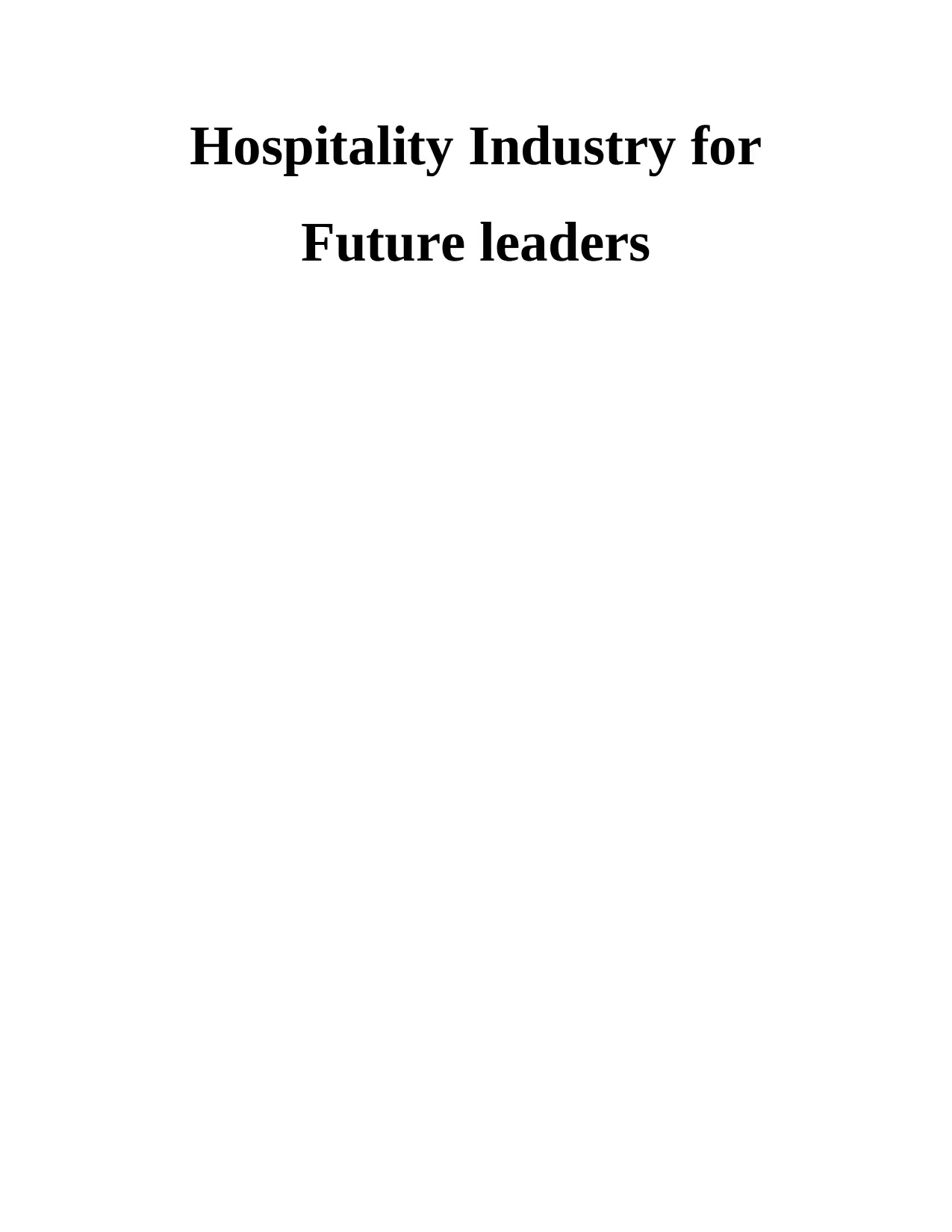
Hospitality Industry for
Future leaders
Future leaders
Secure Best Marks with AI Grader
Need help grading? Try our AI Grader for instant feedback on your assignments.
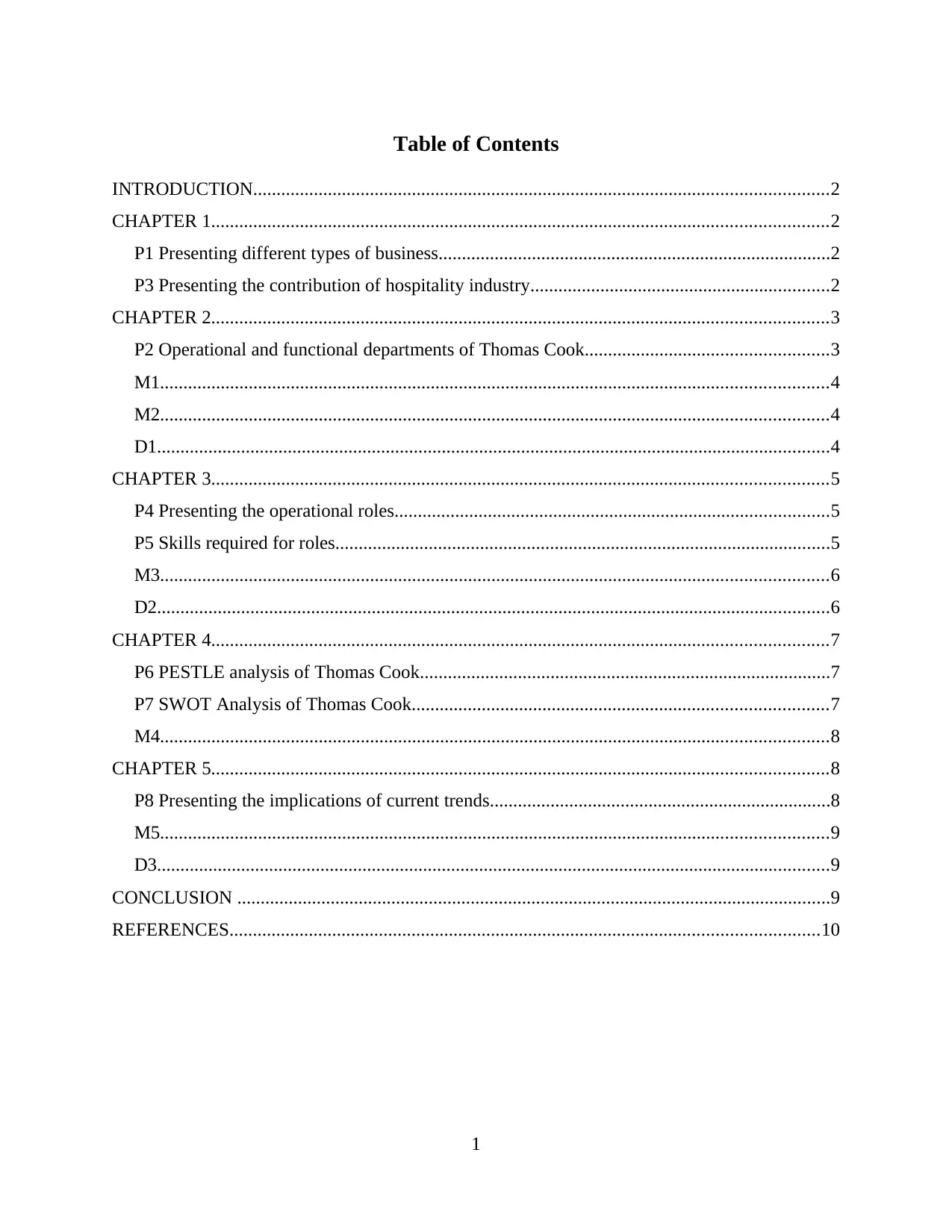
Table of Contents
INTRODUCTION...........................................................................................................................2
CHAPTER 1....................................................................................................................................2
P1 Presenting different types of business....................................................................................2
P3 Presenting the contribution of hospitality industry................................................................2
CHAPTER 2....................................................................................................................................3
P2 Operational and functional departments of Thomas Cook....................................................3
M1...............................................................................................................................................4
M2...............................................................................................................................................4
D1................................................................................................................................................4
CHAPTER 3....................................................................................................................................5
P4 Presenting the operational roles.............................................................................................5
P5 Skills required for roles..........................................................................................................5
M3...............................................................................................................................................6
D2................................................................................................................................................6
CHAPTER 4....................................................................................................................................7
P6 PESTLE analysis of Thomas Cook........................................................................................7
P7 SWOT Analysis of Thomas Cook.........................................................................................7
M4...............................................................................................................................................8
CHAPTER 5....................................................................................................................................8
P8 Presenting the implications of current trends.........................................................................8
M5...............................................................................................................................................9
D3................................................................................................................................................9
CONCLUSION ...............................................................................................................................9
REFERENCES..............................................................................................................................10
1
INTRODUCTION...........................................................................................................................2
CHAPTER 1....................................................................................................................................2
P1 Presenting different types of business....................................................................................2
P3 Presenting the contribution of hospitality industry................................................................2
CHAPTER 2....................................................................................................................................3
P2 Operational and functional departments of Thomas Cook....................................................3
M1...............................................................................................................................................4
M2...............................................................................................................................................4
D1................................................................................................................................................4
CHAPTER 3....................................................................................................................................5
P4 Presenting the operational roles.............................................................................................5
P5 Skills required for roles..........................................................................................................5
M3...............................................................................................................................................6
D2................................................................................................................................................6
CHAPTER 4....................................................................................................................................7
P6 PESTLE analysis of Thomas Cook........................................................................................7
P7 SWOT Analysis of Thomas Cook.........................................................................................7
M4...............................................................................................................................................8
CHAPTER 5....................................................................................................................................8
P8 Presenting the implications of current trends.........................................................................8
M5...............................................................................................................................................9
D3................................................................................................................................................9
CONCLUSION ...............................................................................................................................9
REFERENCES..............................................................................................................................10
1
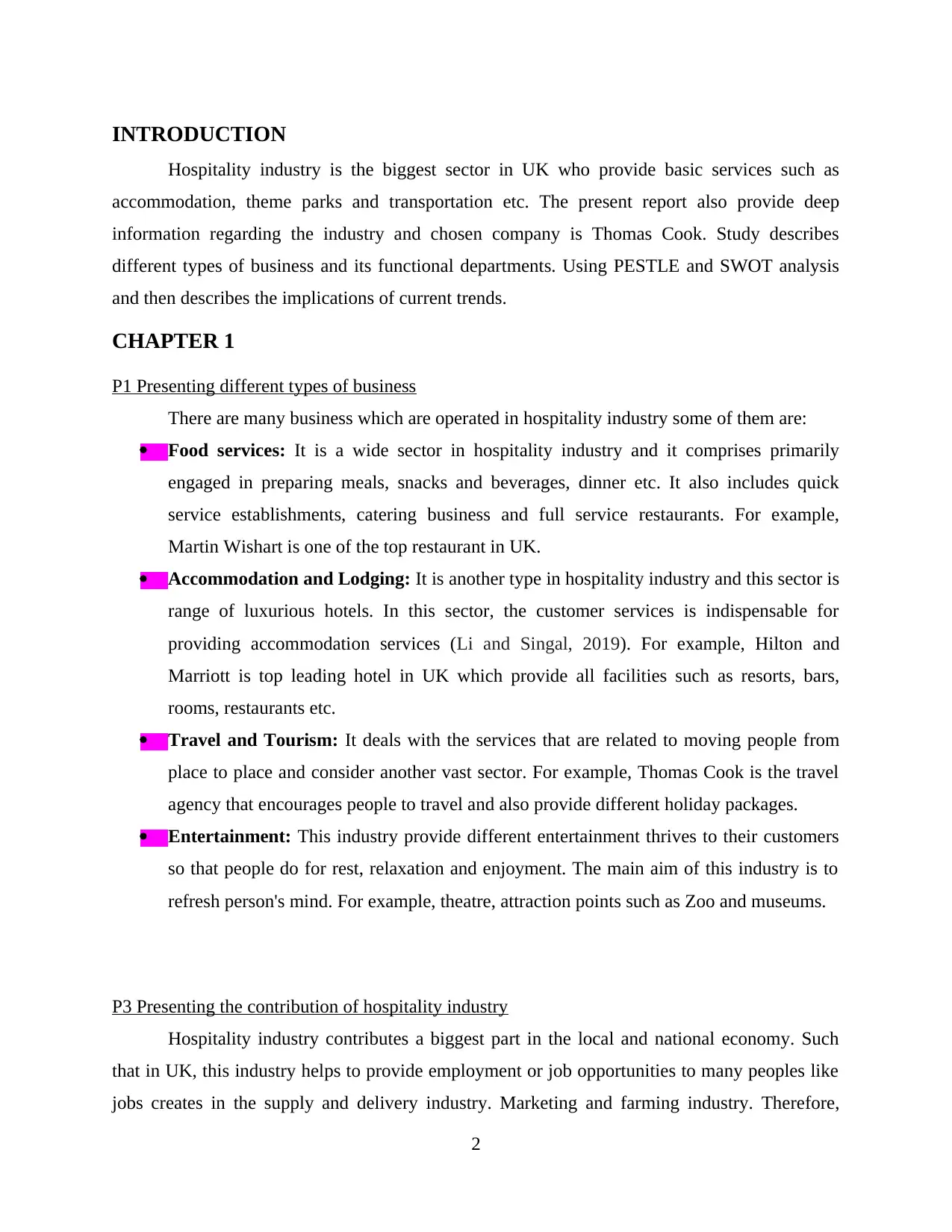
INTRODUCTION
Hospitality industry is the biggest sector in UK who provide basic services such as
accommodation, theme parks and transportation etc. The present report also provide deep
information regarding the industry and chosen company is Thomas Cook. Study describes
different types of business and its functional departments. Using PESTLE and SWOT analysis
and then describes the implications of current trends.
CHAPTER 1
P1 Presenting different types of business
There are many business which are operated in hospitality industry some of them are:
Food services: It is a wide sector in hospitality industry and it comprises primarily
engaged in preparing meals, snacks and beverages, dinner etc. It also includes quick
service establishments, catering business and full service restaurants. For example,
Martin Wishart is one of the top restaurant in UK.
Accommodation and Lodging: It is another type in hospitality industry and this sector is
range of luxurious hotels. In this sector, the customer services is indispensable for
providing accommodation services (Li and Singal, 2019). For example, Hilton and
Marriott is top leading hotel in UK which provide all facilities such as resorts, bars,
rooms, restaurants etc.
Travel and Tourism: It deals with the services that are related to moving people from
place to place and consider another vast sector. For example, Thomas Cook is the travel
agency that encourages people to travel and also provide different holiday packages.
Entertainment: This industry provide different entertainment thrives to their customers
so that people do for rest, relaxation and enjoyment. The main aim of this industry is to
refresh person's mind. For example, theatre, attraction points such as Zoo and museums.
P3 Presenting the contribution of hospitality industry
Hospitality industry contributes a biggest part in the local and national economy. Such
that in UK, this industry helps to provide employment or job opportunities to many peoples like
jobs creates in the supply and delivery industry. Marketing and farming industry. Therefore,
2
Hospitality industry is the biggest sector in UK who provide basic services such as
accommodation, theme parks and transportation etc. The present report also provide deep
information regarding the industry and chosen company is Thomas Cook. Study describes
different types of business and its functional departments. Using PESTLE and SWOT analysis
and then describes the implications of current trends.
CHAPTER 1
P1 Presenting different types of business
There are many business which are operated in hospitality industry some of them are:
Food services: It is a wide sector in hospitality industry and it comprises primarily
engaged in preparing meals, snacks and beverages, dinner etc. It also includes quick
service establishments, catering business and full service restaurants. For example,
Martin Wishart is one of the top restaurant in UK.
Accommodation and Lodging: It is another type in hospitality industry and this sector is
range of luxurious hotels. In this sector, the customer services is indispensable for
providing accommodation services (Li and Singal, 2019). For example, Hilton and
Marriott is top leading hotel in UK which provide all facilities such as resorts, bars,
rooms, restaurants etc.
Travel and Tourism: It deals with the services that are related to moving people from
place to place and consider another vast sector. For example, Thomas Cook is the travel
agency that encourages people to travel and also provide different holiday packages.
Entertainment: This industry provide different entertainment thrives to their customers
so that people do for rest, relaxation and enjoyment. The main aim of this industry is to
refresh person's mind. For example, theatre, attraction points such as Zoo and museums.
P3 Presenting the contribution of hospitality industry
Hospitality industry contributes a biggest part in the local and national economy. Such
that in UK, this industry helps to provide employment or job opportunities to many peoples like
jobs creates in the supply and delivery industry. Marketing and farming industry. Therefore,
2
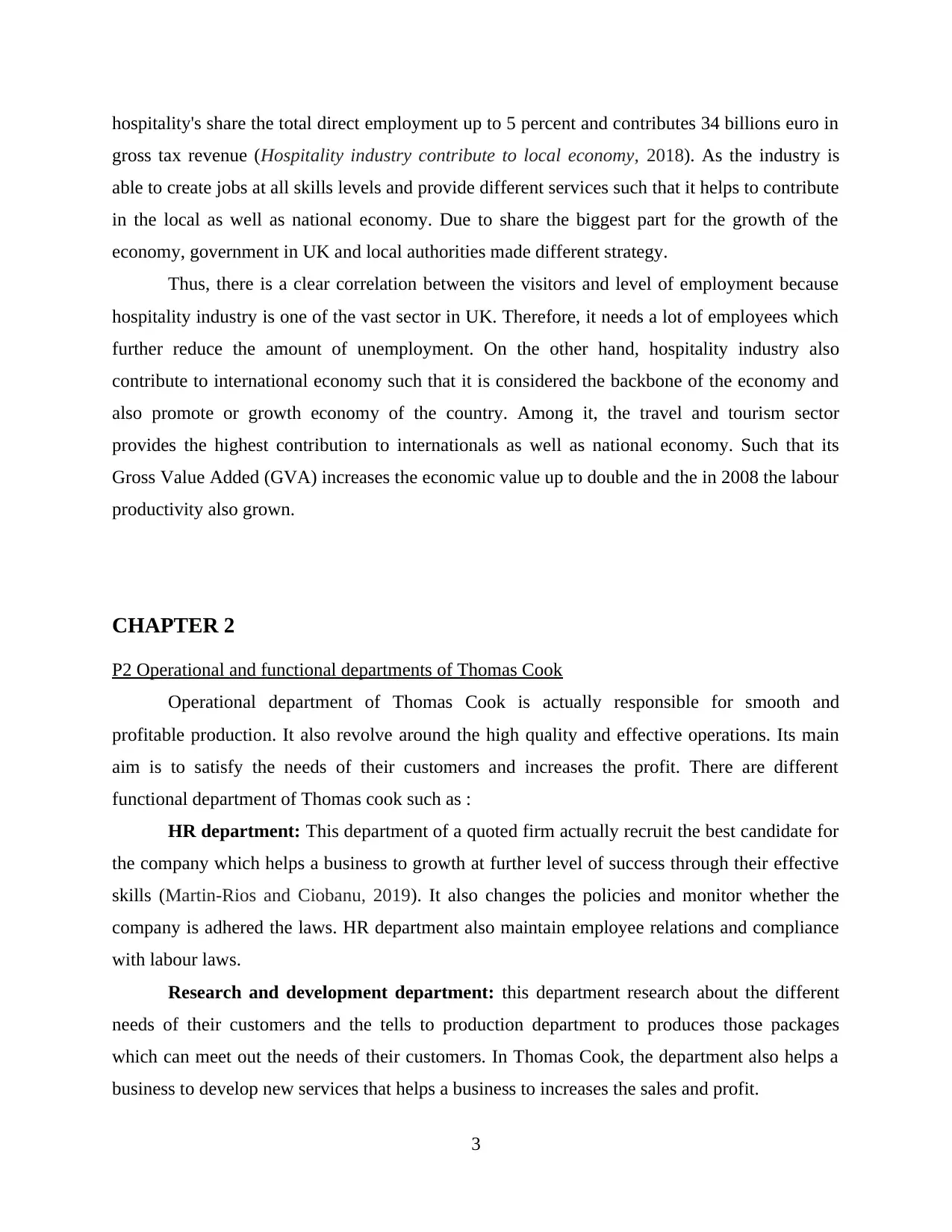
hospitality's share the total direct employment up to 5 percent and contributes 34 billions euro in
gross tax revenue (Hospitality industry contribute to local economy, 2018). As the industry is
able to create jobs at all skills levels and provide different services such that it helps to contribute
in the local as well as national economy. Due to share the biggest part for the growth of the
economy, government in UK and local authorities made different strategy.
Thus, there is a clear correlation between the visitors and level of employment because
hospitality industry is one of the vast sector in UK. Therefore, it needs a lot of employees which
further reduce the amount of unemployment. On the other hand, hospitality industry also
contribute to international economy such that it is considered the backbone of the economy and
also promote or growth economy of the country. Among it, the travel and tourism sector
provides the highest contribution to internationals as well as national economy. Such that its
Gross Value Added (GVA) increases the economic value up to double and the in 2008 the labour
productivity also grown.
CHAPTER 2
P2 Operational and functional departments of Thomas Cook
Operational department of Thomas Cook is actually responsible for smooth and
profitable production. It also revolve around the high quality and effective operations. Its main
aim is to satisfy the needs of their customers and increases the profit. There are different
functional department of Thomas cook such as :
HR department: This department of a quoted firm actually recruit the best candidate for
the company which helps a business to growth at further level of success through their effective
skills (Martin-Rios and Ciobanu, 2019). It also changes the policies and monitor whether the
company is adhered the laws. HR department also maintain employee relations and compliance
with labour laws.
Research and development department: this department research about the different
needs of their customers and the tells to production department to produces those packages
which can meet out the needs of their customers. In Thomas Cook, the department also helps a
business to develop new services that helps a business to increases the sales and profit.
3
gross tax revenue (Hospitality industry contribute to local economy, 2018). As the industry is
able to create jobs at all skills levels and provide different services such that it helps to contribute
in the local as well as national economy. Due to share the biggest part for the growth of the
economy, government in UK and local authorities made different strategy.
Thus, there is a clear correlation between the visitors and level of employment because
hospitality industry is one of the vast sector in UK. Therefore, it needs a lot of employees which
further reduce the amount of unemployment. On the other hand, hospitality industry also
contribute to international economy such that it is considered the backbone of the economy and
also promote or growth economy of the country. Among it, the travel and tourism sector
provides the highest contribution to internationals as well as national economy. Such that its
Gross Value Added (GVA) increases the economic value up to double and the in 2008 the labour
productivity also grown.
CHAPTER 2
P2 Operational and functional departments of Thomas Cook
Operational department of Thomas Cook is actually responsible for smooth and
profitable production. It also revolve around the high quality and effective operations. Its main
aim is to satisfy the needs of their customers and increases the profit. There are different
functional department of Thomas cook such as :
HR department: This department of a quoted firm actually recruit the best candidate for
the company which helps a business to growth at further level of success through their effective
skills (Martin-Rios and Ciobanu, 2019). It also changes the policies and monitor whether the
company is adhered the laws. HR department also maintain employee relations and compliance
with labour laws.
Research and development department: this department research about the different
needs of their customers and the tells to production department to produces those packages
which can meet out the needs of their customers. In Thomas Cook, the department also helps a
business to develop new services that helps a business to increases the sales and profit.
3
Secure Best Marks with AI Grader
Need help grading? Try our AI Grader for instant feedback on your assignments.
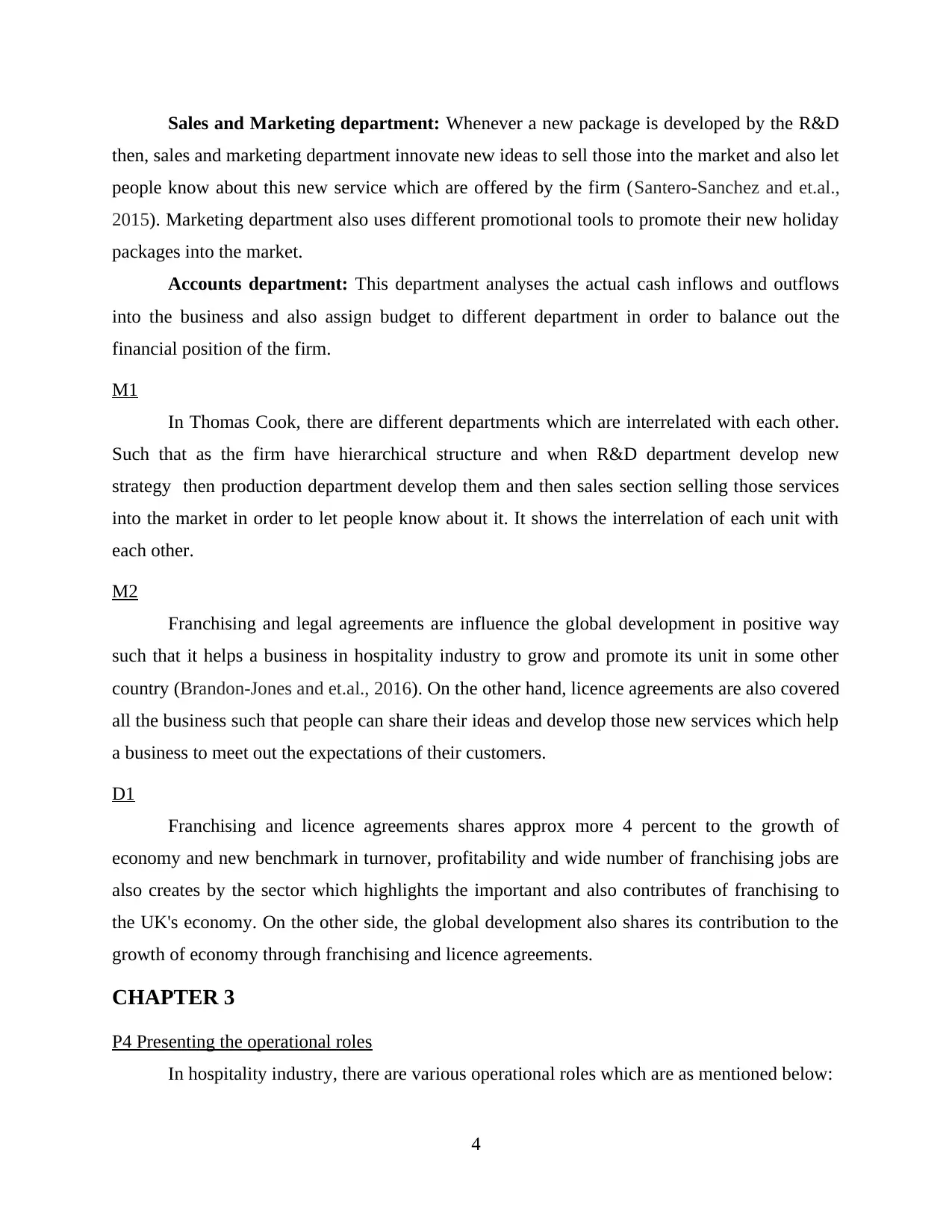
Sales and Marketing department: Whenever a new package is developed by the R&D
then, sales and marketing department innovate new ideas to sell those into the market and also let
people know about this new service which are offered by the firm (Santero-Sanchez and et.al.,
2015). Marketing department also uses different promotional tools to promote their new holiday
packages into the market.
Accounts department: This department analyses the actual cash inflows and outflows
into the business and also assign budget to different department in order to balance out the
financial position of the firm.
M1
In Thomas Cook, there are different departments which are interrelated with each other.
Such that as the firm have hierarchical structure and when R&D department develop new
strategy then production department develop them and then sales section selling those services
into the market in order to let people know about it. It shows the interrelation of each unit with
each other.
M2
Franchising and legal agreements are influence the global development in positive way
such that it helps a business in hospitality industry to grow and promote its unit in some other
country (Brandon-Jones and et.al., 2016). On the other hand, licence agreements are also covered
all the business such that people can share their ideas and develop those new services which help
a business to meet out the expectations of their customers.
D1
Franchising and licence agreements shares approx more 4 percent to the growth of
economy and new benchmark in turnover, profitability and wide number of franchising jobs are
also creates by the sector which highlights the important and also contributes of franchising to
the UK's economy. On the other side, the global development also shares its contribution to the
growth of economy through franchising and licence agreements.
CHAPTER 3
P4 Presenting the operational roles
In hospitality industry, there are various operational roles which are as mentioned below:
4
then, sales and marketing department innovate new ideas to sell those into the market and also let
people know about this new service which are offered by the firm (Santero-Sanchez and et.al.,
2015). Marketing department also uses different promotional tools to promote their new holiday
packages into the market.
Accounts department: This department analyses the actual cash inflows and outflows
into the business and also assign budget to different department in order to balance out the
financial position of the firm.
M1
In Thomas Cook, there are different departments which are interrelated with each other.
Such that as the firm have hierarchical structure and when R&D department develop new
strategy then production department develop them and then sales section selling those services
into the market in order to let people know about it. It shows the interrelation of each unit with
each other.
M2
Franchising and legal agreements are influence the global development in positive way
such that it helps a business in hospitality industry to grow and promote its unit in some other
country (Brandon-Jones and et.al., 2016). On the other hand, licence agreements are also covered
all the business such that people can share their ideas and develop those new services which help
a business to meet out the expectations of their customers.
D1
Franchising and licence agreements shares approx more 4 percent to the growth of
economy and new benchmark in turnover, profitability and wide number of franchising jobs are
also creates by the sector which highlights the important and also contributes of franchising to
the UK's economy. On the other side, the global development also shares its contribution to the
growth of economy through franchising and licence agreements.
CHAPTER 3
P4 Presenting the operational roles
In hospitality industry, there are various operational roles which are as mentioned below:
4
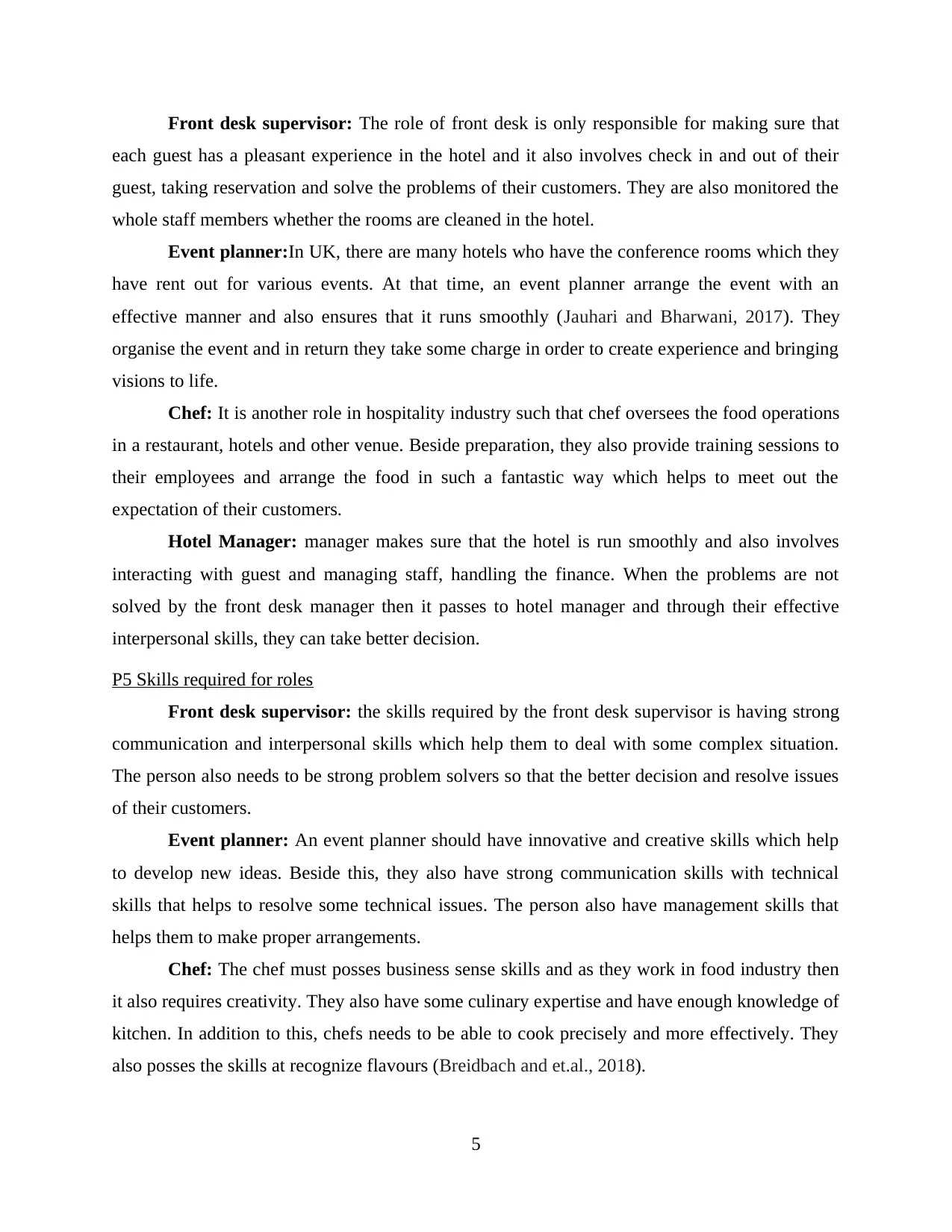
Front desk supervisor: The role of front desk is only responsible for making sure that
each guest has a pleasant experience in the hotel and it also involves check in and out of their
guest, taking reservation and solve the problems of their customers. They are also monitored the
whole staff members whether the rooms are cleaned in the hotel.
Event planner:In UK, there are many hotels who have the conference rooms which they
have rent out for various events. At that time, an event planner arrange the event with an
effective manner and also ensures that it runs smoothly (Jauhari and Bharwani, 2017). They
organise the event and in return they take some charge in order to create experience and bringing
visions to life.
Chef: It is another role in hospitality industry such that chef oversees the food operations
in a restaurant, hotels and other venue. Beside preparation, they also provide training sessions to
their employees and arrange the food in such a fantastic way which helps to meet out the
expectation of their customers.
Hotel Manager: manager makes sure that the hotel is run smoothly and also involves
interacting with guest and managing staff, handling the finance. When the problems are not
solved by the front desk manager then it passes to hotel manager and through their effective
interpersonal skills, they can take better decision.
P5 Skills required for roles
Front desk supervisor: the skills required by the front desk supervisor is having strong
communication and interpersonal skills which help them to deal with some complex situation.
The person also needs to be strong problem solvers so that the better decision and resolve issues
of their customers.
Event planner: An event planner should have innovative and creative skills which help
to develop new ideas. Beside this, they also have strong communication skills with technical
skills that helps to resolve some technical issues. The person also have management skills that
helps them to make proper arrangements.
Chef: The chef must posses business sense skills and as they work in food industry then
it also requires creativity. They also have some culinary expertise and have enough knowledge of
kitchen. In addition to this, chefs needs to be able to cook precisely and more effectively. They
also posses the skills at recognize flavours (Breidbach and et.al., 2018).
5
each guest has a pleasant experience in the hotel and it also involves check in and out of their
guest, taking reservation and solve the problems of their customers. They are also monitored the
whole staff members whether the rooms are cleaned in the hotel.
Event planner:In UK, there are many hotels who have the conference rooms which they
have rent out for various events. At that time, an event planner arrange the event with an
effective manner and also ensures that it runs smoothly (Jauhari and Bharwani, 2017). They
organise the event and in return they take some charge in order to create experience and bringing
visions to life.
Chef: It is another role in hospitality industry such that chef oversees the food operations
in a restaurant, hotels and other venue. Beside preparation, they also provide training sessions to
their employees and arrange the food in such a fantastic way which helps to meet out the
expectation of their customers.
Hotel Manager: manager makes sure that the hotel is run smoothly and also involves
interacting with guest and managing staff, handling the finance. When the problems are not
solved by the front desk manager then it passes to hotel manager and through their effective
interpersonal skills, they can take better decision.
P5 Skills required for roles
Front desk supervisor: the skills required by the front desk supervisor is having strong
communication and interpersonal skills which help them to deal with some complex situation.
The person also needs to be strong problem solvers so that the better decision and resolve issues
of their customers.
Event planner: An event planner should have innovative and creative skills which help
to develop new ideas. Beside this, they also have strong communication skills with technical
skills that helps to resolve some technical issues. The person also have management skills that
helps them to make proper arrangements.
Chef: The chef must posses business sense skills and as they work in food industry then
it also requires creativity. They also have some culinary expertise and have enough knowledge of
kitchen. In addition to this, chefs needs to be able to cook precisely and more effectively. They
also posses the skills at recognize flavours (Breidbach and et.al., 2018).
5
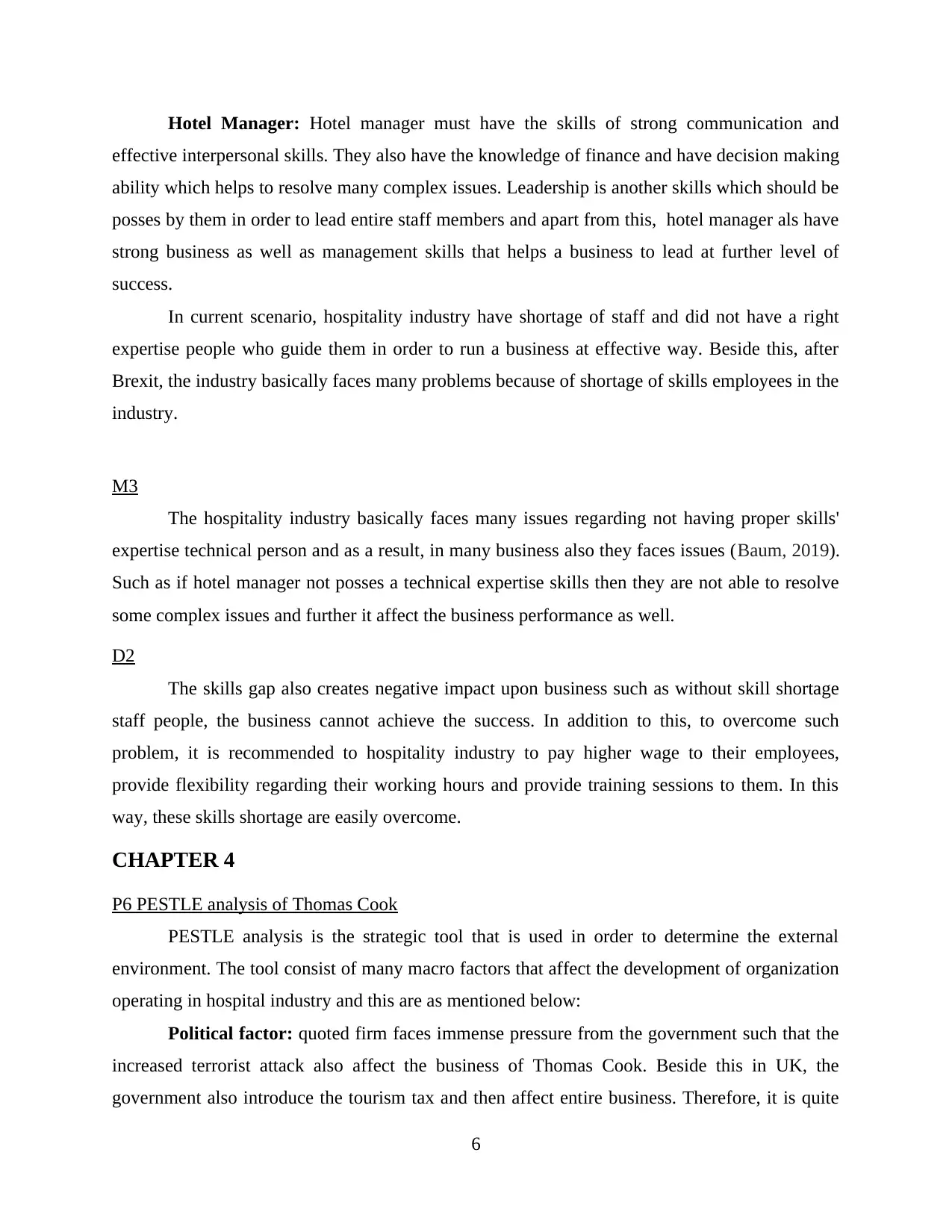
Hotel Manager: Hotel manager must have the skills of strong communication and
effective interpersonal skills. They also have the knowledge of finance and have decision making
ability which helps to resolve many complex issues. Leadership is another skills which should be
posses by them in order to lead entire staff members and apart from this, hotel manager als have
strong business as well as management skills that helps a business to lead at further level of
success.
In current scenario, hospitality industry have shortage of staff and did not have a right
expertise people who guide them in order to run a business at effective way. Beside this, after
Brexit, the industry basically faces many problems because of shortage of skills employees in the
industry.
M3
The hospitality industry basically faces many issues regarding not having proper skills'
expertise technical person and as a result, in many business also they faces issues (Baum, 2019).
Such as if hotel manager not posses a technical expertise skills then they are not able to resolve
some complex issues and further it affect the business performance as well.
D2
The skills gap also creates negative impact upon business such as without skill shortage
staff people, the business cannot achieve the success. In addition to this, to overcome such
problem, it is recommended to hospitality industry to pay higher wage to their employees,
provide flexibility regarding their working hours and provide training sessions to them. In this
way, these skills shortage are easily overcome.
CHAPTER 4
P6 PESTLE analysis of Thomas Cook
PESTLE analysis is the strategic tool that is used in order to determine the external
environment. The tool consist of many macro factors that affect the development of organization
operating in hospital industry and this are as mentioned below:
Political factor: quoted firm faces immense pressure from the government such that the
increased terrorist attack also affect the business of Thomas Cook. Beside this in UK, the
government also introduce the tourism tax and then affect entire business. Therefore, it is quite
6
effective interpersonal skills. They also have the knowledge of finance and have decision making
ability which helps to resolve many complex issues. Leadership is another skills which should be
posses by them in order to lead entire staff members and apart from this, hotel manager als have
strong business as well as management skills that helps a business to lead at further level of
success.
In current scenario, hospitality industry have shortage of staff and did not have a right
expertise people who guide them in order to run a business at effective way. Beside this, after
Brexit, the industry basically faces many problems because of shortage of skills employees in the
industry.
M3
The hospitality industry basically faces many issues regarding not having proper skills'
expertise technical person and as a result, in many business also they faces issues (Baum, 2019).
Such as if hotel manager not posses a technical expertise skills then they are not able to resolve
some complex issues and further it affect the business performance as well.
D2
The skills gap also creates negative impact upon business such as without skill shortage
staff people, the business cannot achieve the success. In addition to this, to overcome such
problem, it is recommended to hospitality industry to pay higher wage to their employees,
provide flexibility regarding their working hours and provide training sessions to them. In this
way, these skills shortage are easily overcome.
CHAPTER 4
P6 PESTLE analysis of Thomas Cook
PESTLE analysis is the strategic tool that is used in order to determine the external
environment. The tool consist of many macro factors that affect the development of organization
operating in hospital industry and this are as mentioned below:
Political factor: quoted firm faces immense pressure from the government such that the
increased terrorist attack also affect the business of Thomas Cook. Beside this in UK, the
government also introduce the tourism tax and then affect entire business. Therefore, it is quite
6
Paraphrase This Document
Need a fresh take? Get an instant paraphrase of this document with our AI Paraphraser
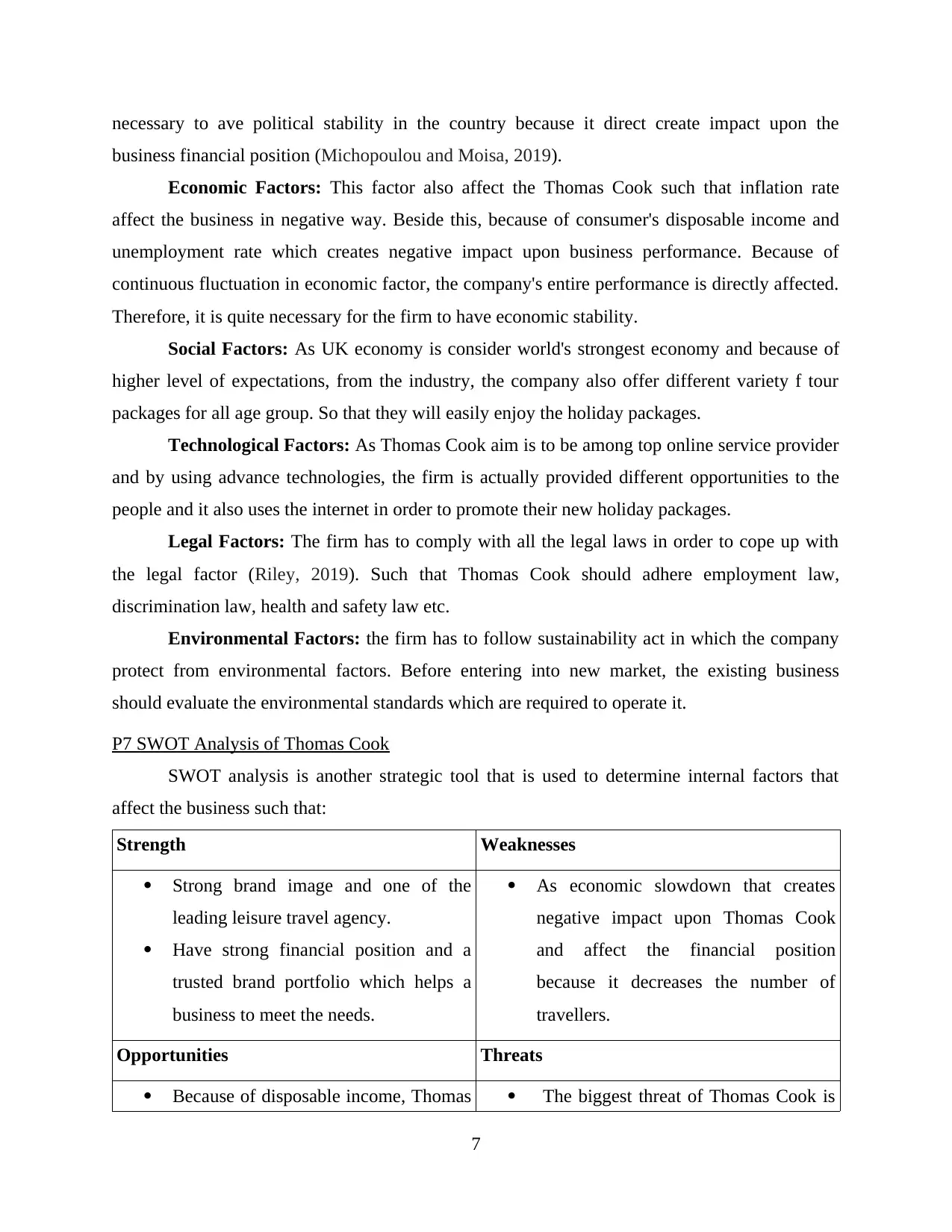
necessary to ave political stability in the country because it direct create impact upon the
business financial position (Michopoulou and Moisa, 2019).
Economic Factors: This factor also affect the Thomas Cook such that inflation rate
affect the business in negative way. Beside this, because of consumer's disposable income and
unemployment rate which creates negative impact upon business performance. Because of
continuous fluctuation in economic factor, the company's entire performance is directly affected.
Therefore, it is quite necessary for the firm to have economic stability.
Social Factors: As UK economy is consider world's strongest economy and because of
higher level of expectations, from the industry, the company also offer different variety f tour
packages for all age group. So that they will easily enjoy the holiday packages.
Technological Factors: As Thomas Cook aim is to be among top online service provider
and by using advance technologies, the firm is actually provided different opportunities to the
people and it also uses the internet in order to promote their new holiday packages.
Legal Factors: The firm has to comply with all the legal laws in order to cope up with
the legal factor (Riley, 2019). Such that Thomas Cook should adhere employment law,
discrimination law, health and safety law etc.
Environmental Factors: the firm has to follow sustainability act in which the company
protect from environmental factors. Before entering into new market, the existing business
should evaluate the environmental standards which are required to operate it.
P7 SWOT Analysis of Thomas Cook
SWOT analysis is another strategic tool that is used to determine internal factors that
affect the business such that:
Strength Weaknesses
Strong brand image and one of the
leading leisure travel agency.
Have strong financial position and a
trusted brand portfolio which helps a
business to meet the needs.
As economic slowdown that creates
negative impact upon Thomas Cook
and affect the financial position
because it decreases the number of
travellers.
Opportunities Threats
Because of disposable income, Thomas The biggest threat of Thomas Cook is
7
business financial position (Michopoulou and Moisa, 2019).
Economic Factors: This factor also affect the Thomas Cook such that inflation rate
affect the business in negative way. Beside this, because of consumer's disposable income and
unemployment rate which creates negative impact upon business performance. Because of
continuous fluctuation in economic factor, the company's entire performance is directly affected.
Therefore, it is quite necessary for the firm to have economic stability.
Social Factors: As UK economy is consider world's strongest economy and because of
higher level of expectations, from the industry, the company also offer different variety f tour
packages for all age group. So that they will easily enjoy the holiday packages.
Technological Factors: As Thomas Cook aim is to be among top online service provider
and by using advance technologies, the firm is actually provided different opportunities to the
people and it also uses the internet in order to promote their new holiday packages.
Legal Factors: The firm has to comply with all the legal laws in order to cope up with
the legal factor (Riley, 2019). Such that Thomas Cook should adhere employment law,
discrimination law, health and safety law etc.
Environmental Factors: the firm has to follow sustainability act in which the company
protect from environmental factors. Before entering into new market, the existing business
should evaluate the environmental standards which are required to operate it.
P7 SWOT Analysis of Thomas Cook
SWOT analysis is another strategic tool that is used to determine internal factors that
affect the business such that:
Strength Weaknesses
Strong brand image and one of the
leading leisure travel agency.
Have strong financial position and a
trusted brand portfolio which helps a
business to meet the needs.
As economic slowdown that creates
negative impact upon Thomas Cook
and affect the financial position
because it decreases the number of
travellers.
Opportunities Threats
Because of disposable income, Thomas The biggest threat of Thomas Cook is
7
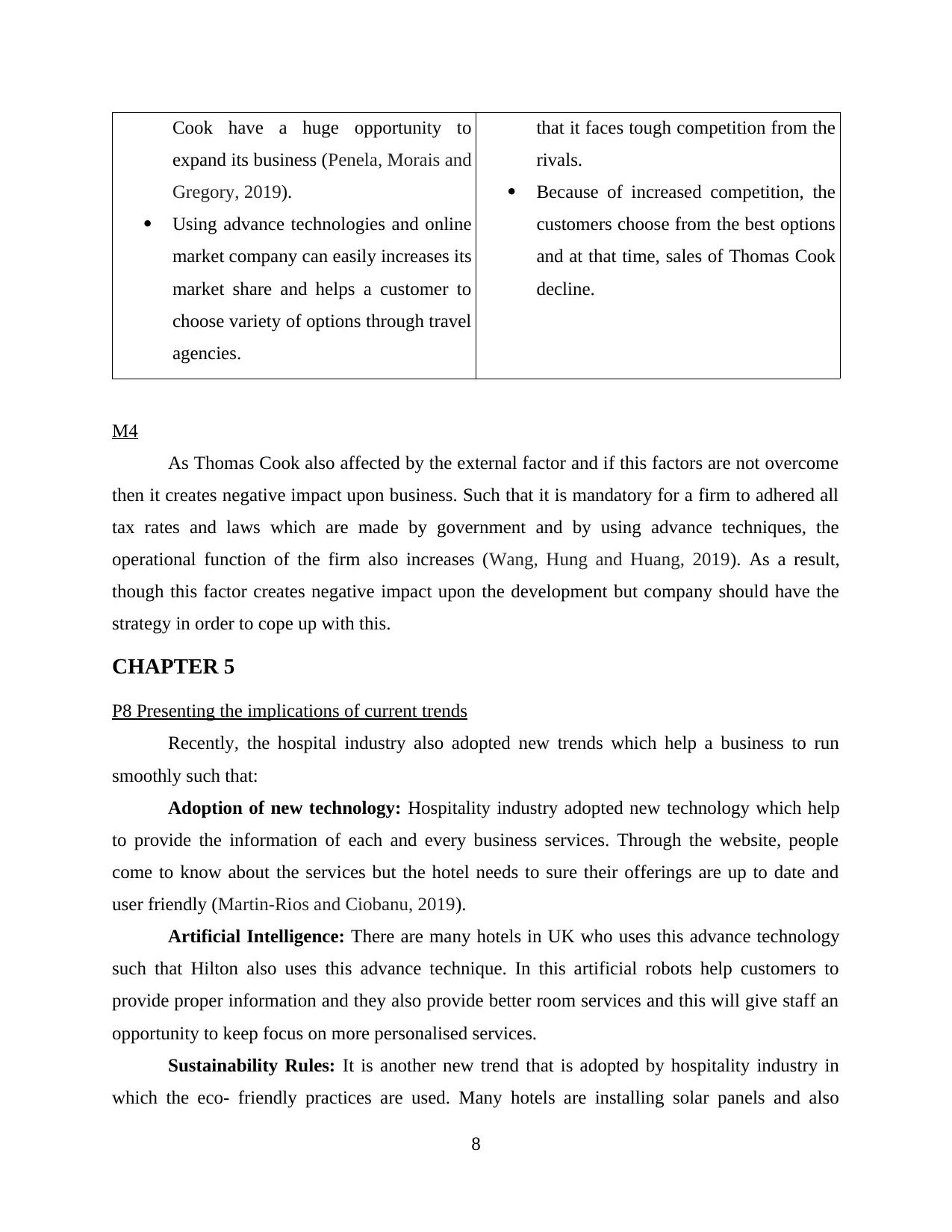
Cook have a huge opportunity to
expand its business (Penela, Morais and
Gregory, 2019).
Using advance technologies and online
market company can easily increases its
market share and helps a customer to
choose variety of options through travel
agencies.
that it faces tough competition from the
rivals.
Because of increased competition, the
customers choose from the best options
and at that time, sales of Thomas Cook
decline.
M4
As Thomas Cook also affected by the external factor and if this factors are not overcome
then it creates negative impact upon business. Such that it is mandatory for a firm to adhered all
tax rates and laws which are made by government and by using advance techniques, the
operational function of the firm also increases (Wang, Hung and Huang, 2019). As a result,
though this factor creates negative impact upon the development but company should have the
strategy in order to cope up with this.
CHAPTER 5
P8 Presenting the implications of current trends
Recently, the hospital industry also adopted new trends which help a business to run
smoothly such that:
Adoption of new technology: Hospitality industry adopted new technology which help
to provide the information of each and every business services. Through the website, people
come to know about the services but the hotel needs to sure their offerings are up to date and
user friendly (Martin-Rios and Ciobanu, 2019).
Artificial Intelligence: There are many hotels in UK who uses this advance technology
such that Hilton also uses this advance technique. In this artificial robots help customers to
provide proper information and they also provide better room services and this will give staff an
opportunity to keep focus on more personalised services.
Sustainability Rules: It is another new trend that is adopted by hospitality industry in
which the eco- friendly practices are used. Many hotels are installing solar panels and also
8
expand its business (Penela, Morais and
Gregory, 2019).
Using advance technologies and online
market company can easily increases its
market share and helps a customer to
choose variety of options through travel
agencies.
that it faces tough competition from the
rivals.
Because of increased competition, the
customers choose from the best options
and at that time, sales of Thomas Cook
decline.
M4
As Thomas Cook also affected by the external factor and if this factors are not overcome
then it creates negative impact upon business. Such that it is mandatory for a firm to adhered all
tax rates and laws which are made by government and by using advance techniques, the
operational function of the firm also increases (Wang, Hung and Huang, 2019). As a result,
though this factor creates negative impact upon the development but company should have the
strategy in order to cope up with this.
CHAPTER 5
P8 Presenting the implications of current trends
Recently, the hospital industry also adopted new trends which help a business to run
smoothly such that:
Adoption of new technology: Hospitality industry adopted new technology which help
to provide the information of each and every business services. Through the website, people
come to know about the services but the hotel needs to sure their offerings are up to date and
user friendly (Martin-Rios and Ciobanu, 2019).
Artificial Intelligence: There are many hotels in UK who uses this advance technology
such that Hilton also uses this advance technique. In this artificial robots help customers to
provide proper information and they also provide better room services and this will give staff an
opportunity to keep focus on more personalised services.
Sustainability Rules: It is another new trend that is adopted by hospitality industry in
which the eco- friendly practices are used. Many hotels are installing solar panels and also
8
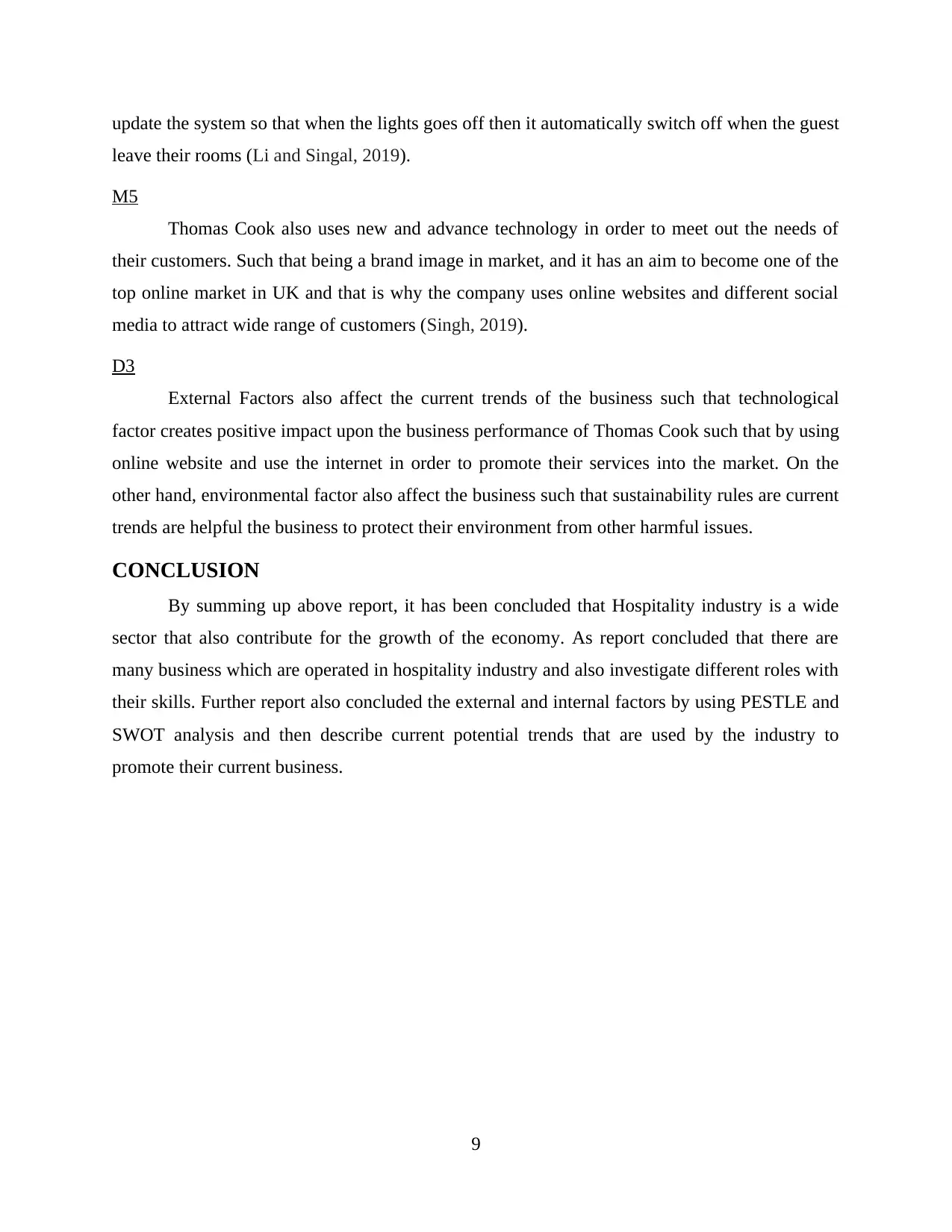
update the system so that when the lights goes off then it automatically switch off when the guest
leave their rooms (Li and Singal, 2019).
M5
Thomas Cook also uses new and advance technology in order to meet out the needs of
their customers. Such that being a brand image in market, and it has an aim to become one of the
top online market in UK and that is why the company uses online websites and different social
media to attract wide range of customers (Singh, 2019).
D3
External Factors also affect the current trends of the business such that technological
factor creates positive impact upon the business performance of Thomas Cook such that by using
online website and use the internet in order to promote their services into the market. On the
other hand, environmental factor also affect the business such that sustainability rules are current
trends are helpful the business to protect their environment from other harmful issues.
CONCLUSION
By summing up above report, it has been concluded that Hospitality industry is a wide
sector that also contribute for the growth of the economy. As report concluded that there are
many business which are operated in hospitality industry and also investigate different roles with
their skills. Further report also concluded the external and internal factors by using PESTLE and
SWOT analysis and then describe current potential trends that are used by the industry to
promote their current business.
9
leave their rooms (Li and Singal, 2019).
M5
Thomas Cook also uses new and advance technology in order to meet out the needs of
their customers. Such that being a brand image in market, and it has an aim to become one of the
top online market in UK and that is why the company uses online websites and different social
media to attract wide range of customers (Singh, 2019).
D3
External Factors also affect the current trends of the business such that technological
factor creates positive impact upon the business performance of Thomas Cook such that by using
online website and use the internet in order to promote their services into the market. On the
other hand, environmental factor also affect the business such that sustainability rules are current
trends are helpful the business to protect their environment from other harmful issues.
CONCLUSION
By summing up above report, it has been concluded that Hospitality industry is a wide
sector that also contribute for the growth of the economy. As report concluded that there are
many business which are operated in hospitality industry and also investigate different roles with
their skills. Further report also concluded the external and internal factors by using PESTLE and
SWOT analysis and then describe current potential trends that are used by the industry to
promote their current business.
9
Secure Best Marks with AI Grader
Need help grading? Try our AI Grader for instant feedback on your assignments.
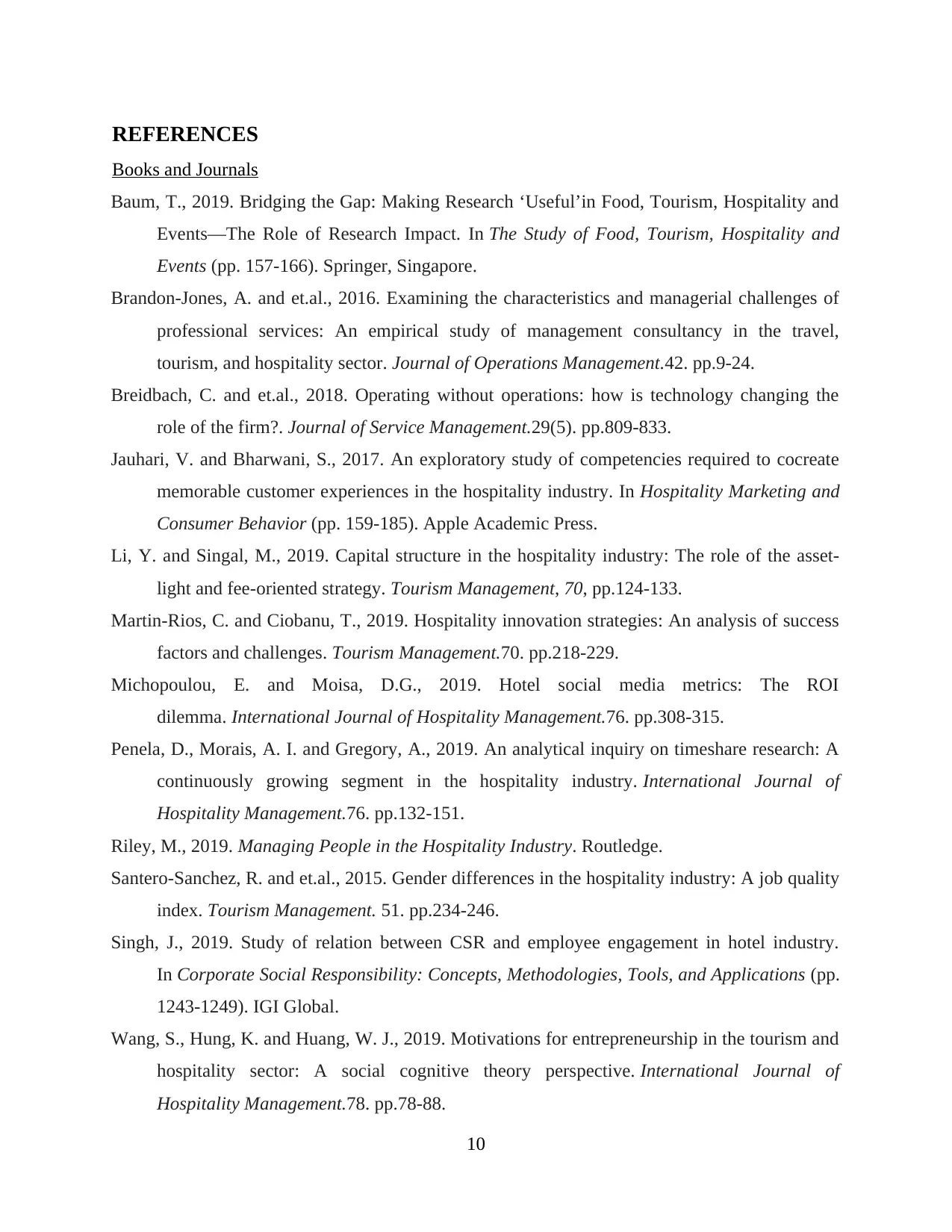
REFERENCES
Books and Journals
Baum, T., 2019. Bridging the Gap: Making Research ‘Useful’in Food, Tourism, Hospitality and
Events—The Role of Research Impact. In The Study of Food, Tourism, Hospitality and
Events (pp. 157-166). Springer, Singapore.
Brandon-Jones, A. and et.al., 2016. Examining the characteristics and managerial challenges of
professional services: An empirical study of management consultancy in the travel,
tourism, and hospitality sector. Journal of Operations Management.42. pp.9-24.
Breidbach, C. and et.al., 2018. Operating without operations: how is technology changing the
role of the firm?. Journal of Service Management.29(5). pp.809-833.
Jauhari, V. and Bharwani, S., 2017. An exploratory study of competencies required to cocreate
memorable customer experiences in the hospitality industry. In Hospitality Marketing and
Consumer Behavior (pp. 159-185). Apple Academic Press.
Li, Y. and Singal, M., 2019. Capital structure in the hospitality industry: The role of the asset-
light and fee-oriented strategy. Tourism Management, 70, pp.124-133.
Martin-Rios, C. and Ciobanu, T., 2019. Hospitality innovation strategies: An analysis of success
factors and challenges. Tourism Management.70. pp.218-229.
Michopoulou, E. and Moisa, D.G., 2019. Hotel social media metrics: The ROI
dilemma. International Journal of Hospitality Management.76. pp.308-315.
Penela, D., Morais, A. I. and Gregory, A., 2019. An analytical inquiry on timeshare research: A
continuously growing segment in the hospitality industry. International Journal of
Hospitality Management.76. pp.132-151.
Riley, M., 2019. Managing People in the Hospitality Industry. Routledge.
Santero-Sanchez, R. and et.al., 2015. Gender differences in the hospitality industry: A job quality
index. Tourism Management. 51. pp.234-246.
Singh, J., 2019. Study of relation between CSR and employee engagement in hotel industry.
In Corporate Social Responsibility: Concepts, Methodologies, Tools, and Applications (pp.
1243-1249). IGI Global.
Wang, S., Hung, K. and Huang, W. J., 2019. Motivations for entrepreneurship in the tourism and
hospitality sector: A social cognitive theory perspective. International Journal of
Hospitality Management.78. pp.78-88.
10
Books and Journals
Baum, T., 2019. Bridging the Gap: Making Research ‘Useful’in Food, Tourism, Hospitality and
Events—The Role of Research Impact. In The Study of Food, Tourism, Hospitality and
Events (pp. 157-166). Springer, Singapore.
Brandon-Jones, A. and et.al., 2016. Examining the characteristics and managerial challenges of
professional services: An empirical study of management consultancy in the travel,
tourism, and hospitality sector. Journal of Operations Management.42. pp.9-24.
Breidbach, C. and et.al., 2018. Operating without operations: how is technology changing the
role of the firm?. Journal of Service Management.29(5). pp.809-833.
Jauhari, V. and Bharwani, S., 2017. An exploratory study of competencies required to cocreate
memorable customer experiences in the hospitality industry. In Hospitality Marketing and
Consumer Behavior (pp. 159-185). Apple Academic Press.
Li, Y. and Singal, M., 2019. Capital structure in the hospitality industry: The role of the asset-
light and fee-oriented strategy. Tourism Management, 70, pp.124-133.
Martin-Rios, C. and Ciobanu, T., 2019. Hospitality innovation strategies: An analysis of success
factors and challenges. Tourism Management.70. pp.218-229.
Michopoulou, E. and Moisa, D.G., 2019. Hotel social media metrics: The ROI
dilemma. International Journal of Hospitality Management.76. pp.308-315.
Penela, D., Morais, A. I. and Gregory, A., 2019. An analytical inquiry on timeshare research: A
continuously growing segment in the hospitality industry. International Journal of
Hospitality Management.76. pp.132-151.
Riley, M., 2019. Managing People in the Hospitality Industry. Routledge.
Santero-Sanchez, R. and et.al., 2015. Gender differences in the hospitality industry: A job quality
index. Tourism Management. 51. pp.234-246.
Singh, J., 2019. Study of relation between CSR and employee engagement in hotel industry.
In Corporate Social Responsibility: Concepts, Methodologies, Tools, and Applications (pp.
1243-1249). IGI Global.
Wang, S., Hung, K. and Huang, W. J., 2019. Motivations for entrepreneurship in the tourism and
hospitality sector: A social cognitive theory perspective. International Journal of
Hospitality Management.78. pp.78-88.
10
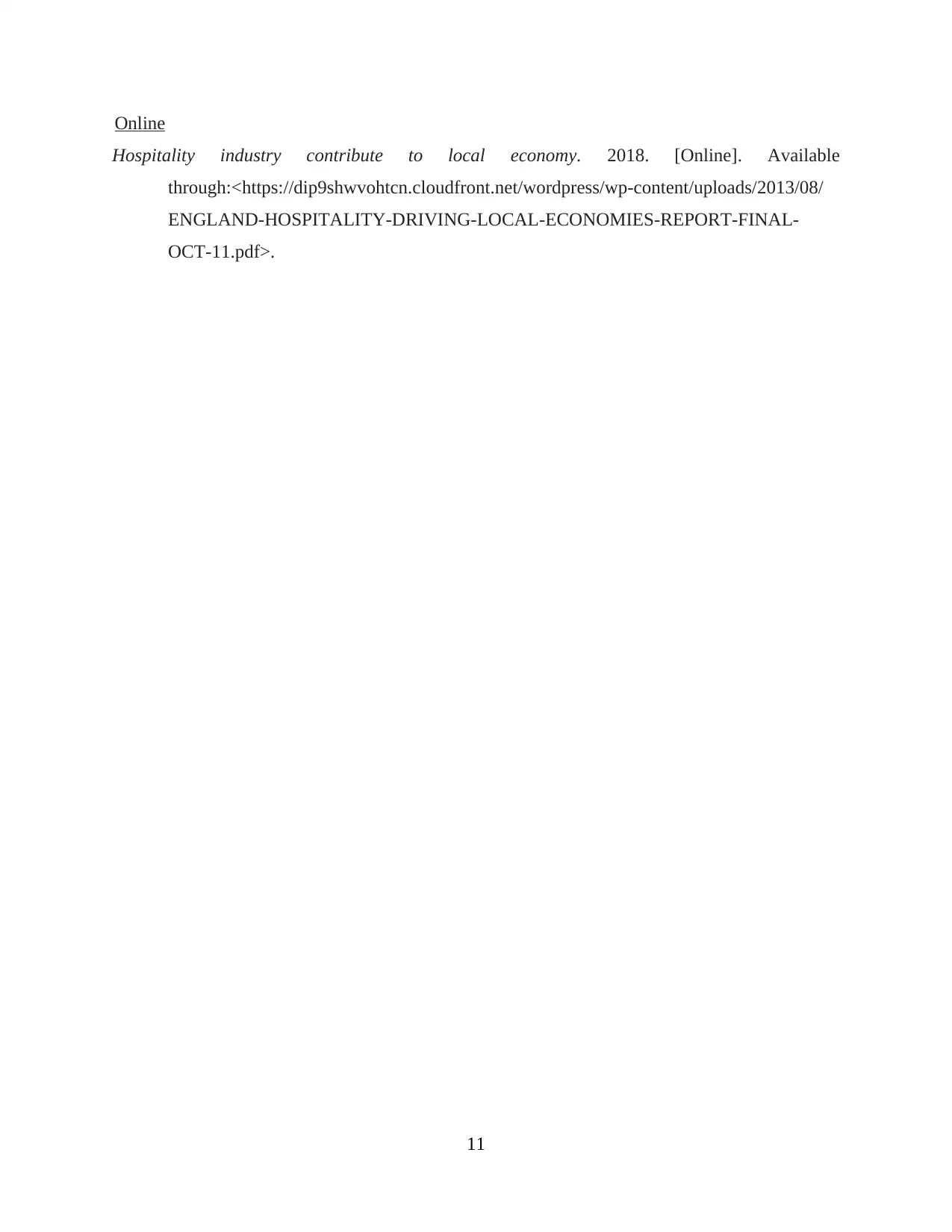
Online
Hospitality industry contribute to local economy. 2018. [Online]. Available
through:<https://dip9shwvohtcn.cloudfront.net/wordpress/wp-content/uploads/2013/08/
ENGLAND-HOSPITALITY-DRIVING-LOCAL-ECONOMIES-REPORT-FINAL-
OCT-11.pdf>.
11
Hospitality industry contribute to local economy. 2018. [Online]. Available
through:<https://dip9shwvohtcn.cloudfront.net/wordpress/wp-content/uploads/2013/08/
ENGLAND-HOSPITALITY-DRIVING-LOCAL-ECONOMIES-REPORT-FINAL-
OCT-11.pdf>.
11
1 out of 12
Related Documents
Your All-in-One AI-Powered Toolkit for Academic Success.
+13062052269
info@desklib.com
Available 24*7 on WhatsApp / Email
![[object Object]](/_next/static/media/star-bottom.7253800d.svg)
Unlock your academic potential
© 2024 | Zucol Services PVT LTD | All rights reserved.





